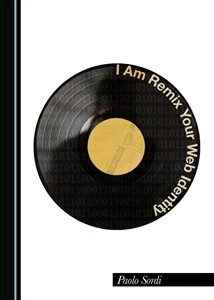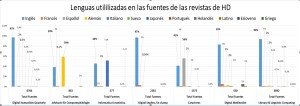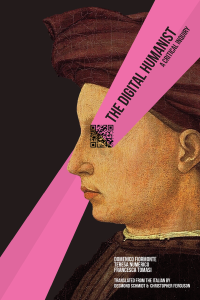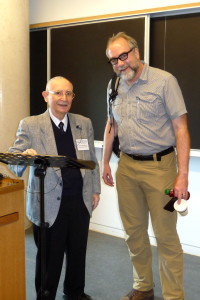I just came across a great French project called Transcrire. The Huma-Num Very Large Facility has built a system for the crowdsourcing of transcription of archival materials. It looks like they have built infrastructure for crowdsourcing (or citizen science) in the humanities. Playing around, it looks very professional.
Category: Education and Administration
CAA and SAH Release Guidelines for the Evaluation of Digital Scholarship in Art and Architectural History
The CAA and SAH Release Guidelines for the Evaluation of Digital Scholarship in Art and Architectural History. The College Art Association and Society of Architectural Historians have released guidelines that include attention to process:
A work of digital scholarship often requires developing or refining a methodology. That work should be evaluated as a contribution to scholarship, just as methodological innovations in traditional scholarship are given weight in assessments of achievement. By extension, digital scholarship may need to be evaluated by the process of analysis in addition to the results of the analysis. (p. 5)
The guidelines go on how to identify the importance of the process through things like project narratives. They also talk about how the “inadequacy of existing peer review for digital scholarship is directly related to the changing nature of publications. In many cases, peer review for a digital publication is little different from that of a print publication,…” It sounds like the arts are going through the same discussions as we are.
List of animals with fraudulent diplomas
Thanks to Twitter I came across this List of animals with fraudulent diplomas on the Wikipedia. As others have pointed out, this is the best Wikipedia page (so far). Here is an example to wet your appetite:
Ben Goldacre, a UK-based physician and science journalist, wrote in 2004 that his cat, Henrietta, had obtained a diploma in nutrition from the American Association of Nutritional Consultants; Goldacre had been investigating allegations about the qualifications claimed by Gillian McKeith.
The Digital Humanist
On Thursday I was part of a conference here in Verona (see my conference notes) that celebrated the seminar I led at the University of Verona and the English publication of The Digital Humanist by Domenico Fiormonte, Francesca Tomasi, and Teresa Numerico (with a Preface by me). This is the English adaptation/translation of their 2010 Italian book which has finally come out in English. Here is the edited text of my presentation. (Thanks to Domenico for helping me with the Italian!)
Dear Friends and Colleagues,
Today we are here to celebrate the end of a laboratory on digital humanities and a beginning with the publication of the The Digital Humanist: A Critical Inquiry by Domenico Fiormonte, Teresa Numerico and Francesca Tomasi.
Oggi si celebra la fine questa laboratorio che abbiamo creato insieme e una la publicazione in Inglese del libro L’umanista digitale che è stato pubblicato per la prima volta in Italiano nel 2010 e poi aggiornato e tradotto in inglese da Desmond Schmidt e Christopher Ferguson.
The English publication of this book is important to the book because part of what makes it “A Critical Inquiry” is that it questions the universality of English. I use the word universality in two senses, both of which are to be questioned:
First, that there is an assumption that we need a universal language or metalanguage – a dream of philosophers, a dream that can be said to have led to the idea of a universal machine or computer,
E secondo, uso la parola universale per il modo in cui l’Inglese invade l’informatica, dai motori di recerca ai linguaggi di programmazione, come abbiamo sentito oggi nelle presentazioni degli studenti.
Il filosofo della scienza e della tecnologia, Langdon Winner, ha scritto un bel testo dal titolo: “Do Artifacts Have Politics?” In questo articolo Winner cerca di navigare tra due posizioni opposte – quella del determinismo tecnologico che sostiene che ogni messaggio è determinato dal tecnologia–
And, he argues that neither can technologies be said to be neutral – the argument of so many technologists that relieves them of the need to take responsibility for what they develop.
Instead Winner argues that we have to attend to the artefacts themselves – some bring baggage or structure experience and some less so.
One of the great contributions of this book is just such a critical attending to the digital artefacts themselves – especially those like search engines or electronic texts that are important to us in the humanities.
Questo libro, invece di parlare dell’informatica in generale – parla delle tecnologie che usiamo come umanisti e ci aiuta a capire l’importanza del nostro lavoro – infatti direi che ci aiuta capire come dobbiamo assumerci la responsabilità per le nostre technologie.
As Heidegger and others point out, sometimes the hardest thing to do is to notice technologies that we use every day like the glasses on the end of our nose. We need to find ways back to noticing the systems of ready-to-hand in which we navigate our desires and dreams. That includes for Heidegger also noticing the way language itself structures our thinking.
But how can we do that? How can we attend? What practices can we draw on from the humanities?
Lev Manovich in an online essay talks about the comedy of breakdowns as an interruption that forces us to notice technology – something that was normal in Russia, but isn’t normal in the West.
Siegfried Zielinski – in Deep Time of the Media proposes an archaeology that pays attention to the failed technologies – the branches that have been left out of the origin myths.
This book provides, I think, three other, uniquely humanities ways into thinking again about technology:
First, it is written from the margins – at least the linguistic margins of an Anglophone discourse of technology (and digital humanities.) It was first written in Italian and draws on an Italian humanities computing tradition. The book reminds us to pay attention to language, so important to the humanities and technology too.
Second, it historicizes the technologies we take for granted – looking, for example, at key figures who imagined our cybernetic future.
Terzo, questo libro non soltanto guarda agli artefatti e ai sistemi in un modo critico, ma guarda anche ai modi in cui noi organizziamo il discorso accademico sull’informatica umanistica – direi che tratta le digital humanities come artefatto umano che deve anche essere criticato, specialmente perché siamo ciechi ai modi nei quali l’organizzazione della disciplina segue la cultura anglo-sassone. The digital humanist ci chiede di criticare come siamo e potremmo essere dei digital humanists. Questa è un questione di ethos – come viviamo con la tecnologia, come ci organizziamo per porre attenzione alla tecnologia
E’ per questo che raccomando questo libro specialmente a voi dotorandi.
For those of you just discovering the digital as a subject for humanities attention I recommend this book – it is a way in for humanists.
Voglio concludere con un commento sulla presentazione dei libri – se un libro e come una neonato – un natio come ne parlava Vico –è anche importante come il libro viene educato insegnato e interpretato.
Remember the lesson of Frankenstein. The tragedy is not that he was made of parts, but that he was abandoned at birth. The same can be said of the digital humanities – a field made of parts.
Questa e la seconda volta che aiuto a presentare questo libro. La prima volta è stata la settimana scorsa a Roma. Direi che addesso sono diventato un presentatore con esperienza nell’ allevamento. Posso annuciare il tour?
As I was just saying in Italian, this is the second time I present this book – and I’ve chosen to do it in two tongues – English and Italian. In this I’m drawing on a Canadian political tradition of bilingual presentations which I have always admired. Such bilingual talks weave two languages to make something that is not a universal language but is free of the particular blindness of a particular language.
My reason for switching is that if we are to avoid the universalizing tendency of technologies of thinking like language we have to habituate ourselves to travel back and forth translating and thinking across. That used to be obvious to the humanities, but we seem to have forgotten that discipline.
Attraversare le lingue è qualcosa che voi Italiani dovete fare per forza – per noi anglo-sassoni è una nuova esperienza – troppo volte aspettiamo che l’atro venga da noi invece di incontrarci a metà strada.
Nel frattempo, The Digital Humanist è un importante tentativo che attraversa Italiano e Inglese per invitarci tutti a dialogare.
Paolo Sordi: I blog therefore I am

On the ethos of digital presence: I participated today in a panel launching the Italian version of Paolo Sordi’s book I Am: Remix Your Web Identity. (The Italian title is Bloggo Con WordPress Dunque Sono.) The panel included people like Domenico Fiormonte, Luisa Capelli, Daniela Guardamangna, Raul Mordenti, and, of course, Paolo Sordi.
On Starving the Humanities in Japan: 4Humanities’ View
Over the last weeks, with lots of help from others, I wrote a position on what is happening in Japan, On Starving the Humanities and Social Sciences of Students and Funding in Japan: 4Humanities’ View. The blog entry presents a 4Humanities view on what appears to be a troubling pattern of de-funding the humanities, arts and social sciences under the mistaken view that they do not contribute to economic growth. The evidence, at least is Canada, is that humanities students do get jobs and do do better than those without university education. They may not do better than those getting a degree in petroleum engineering, but we surely don’t need only engineers. (See my entry on Ignoring the Liberal Arts.)
More worrisome than what is happening in Japan is the politicization of higher-education in North Carolina both at the board level and now with the appointment of a new President of the UNC system, Margaret Spelling. Johann Neem has a disturbing essay in Inside Higher Ed on Margaret Spelling’s Vision for Higher Education. Even more interesting is Neem’s essay on what academics could do if universities become vocational schools, Taking It to the Streets: Preparing for an Academy in Exile.
Data Management Plan Recommendation
Today I deposited a Data Management Plan Recommendation for Social Science and Humanities Funding Agencies (http://hdl.handle.net/10402/era.42201) in our institutional repository ERA. This report/recommendation was written by Sonja Sapach with help from me and Catherine Middleton. We recommended that:
Agencies that fund social science and humanities (SSH) research should move towards requiring a Data Management Plan (DMP) as part of their application processes in cases where research data will be gathered, generated, or curated. In developing policies, funding agencies should consult the community on the values of stewardship and research that would be strengthened by requiring DMPs. Funding agencies should also gather examples and data about reuse of archived data in the social sciences and humanities and encourage due diligence among researchers to make themselves aware of reusable data.
On the surface the recommendation seems rather bland. SSHRC has required the deposit of research data they fund for decades. The problem, however, is that few of us pay attention because it is one more thing to do, and something that shares hard-won data with others that you may want to continue milking for research. What we lack is a culture of thinking of the deposit of research data as a scholarly contribution the way the translation and edition of important cultural texts is. We need a culture of stewardship as a TC3+ (tri-council) document put it. See Capitalizing on Big Data: Toward a Policy Framework for Advancing Digital Scholarship in Canada (PDF).
Given the potential resistance of colleagues it is important that we understand the arguments for requiring planning around data management and that is one of the things we do in this report. Another issue is how to effectively require at the funding proposal end something (like a Data Management Plan) that would show how the researchers are thinking through the issue. To that end we document the approaches of other funding bodies. The point is that this is not actually that new and some research communities are further ahead.
At the end of the day, what we really need is a recognition that depositing data so that it can be used by other researchers is a form of scholarship. Such scholarship can be assessed like any other scholarship. What is the data deposited and what is its quality? How is the data deposited? How is it documented? Can it have an impact?
You can find this document also at Catherine Middleton’s web site and Sonja Sapach’s web site.
What Ever Happened to Project Bamboo?
What Ever Happened to Project Bamboo? by Quinn Dombrowski is one of the few honest discussions about the end of a project. I’ve been meaning to blog this essay which follows on her important conference paper at DH 2013 in Nebraska (see my conference report here which comments on her paper.) The issue of how projects fail or end rarely gets dealt with and Dombrowski deserves credit for having the courage to document the end of a project that promised so much.
I blog about this now as I just finished a day-long meeting of the Leadership Council for Digital Infrastructure where we discussed a submission to Industry Canada that calls for coordinated digital research infrastructure. While the situation is different, we need to learn from projects like Bamboo when we imagine massive investment in research infrastructure. We all know it is important, but doing it right is not as easy as it sounds.
Which brings me back to failure. There are three types of failure:
- The simple type we are happy to talk about where you ran an experiment based on a hypothesis and didn’t get positive results. This type is based on a simplistic model of the scientific process which pretends to value negative results as much as positive ones. We all know the reality is not that simple and, for that matter, that the science model doesn’t really apply to the humanities.
- The messy type where you don’t know why you failed or what exactly failed. This is the type where you promised something in a research or infrastructure proposal and didn’t deliver. This type is harder to report because it reflects badly on you. It is an admission that you were confused or oversold your project.
- The third and bitter type is the project that succeeds on its own terms, but is surpassed by the disciplines. It is when you find your research isn’t current any longer and no one is interested in your results. It is when you find yourself ideologically stranded doing something that someone important has declared critically flawed. It is a failure of assumptions, or theory, or positioning and no one wants to hear about this failure, they just want to avoid it.
When people like Willard McCarty and John Unsworth call for a discussion of failure in the digital humanities they describe the first type, but often mean the second. The idea is to describe a form of failure reporting similar to negative results – or to encourage people to describe their failure as simply negative results. What we need, however, is honest description of the second and third types of failure, because those are expensive. To pretend some expensive project that slowly disappeared in missunderstanding was simply an experiment is missing what was at stake. This is doubly true of infrastructure because infrastructure is not supposed to be experimental. No one pays for roads and their maintenance as an experiment to see if people will take the road. You should be sure the road is needed before building.
Instead, I think we need to value research into infrastructure as something independent of the project owners. We need to do in Canada what the NSF did – bring together research on the history and theory of infrastructure.
Digital Pedagogy Institute
Robert Jay Glickman and Geoffrey Rockwell
Last week I participated in the Digital Pedagogy Institute that was organized by the University of Toronto Scarborough, Brock University and Ryerson University. I kept my Conference Report here.
This Institute focused not only technology in learning but also on important issues around the ethics of different learning models that involve technology. Ways of using technology to get active participation rather than just broadcasting video came up. Ways of thinking about students in collaborative projects came up – we need to get beyond the apprentice model and think of them as “citizen scholars.”
Towards monocultural (digital) Humanities?

Domenico Fiormonte has written a nice essay on how the humanities (and digital humanities) run the risk of becoming monolingual, Towards monocultural (digital) Humanities?. The essay is a response to Greg Crane’s The Big Humanities, National Identity and the Digital Humanities in Germany and Greg responds then to Domenico here. The numbers are depressing (see the graphs from Domenico above). As he puts it (drawing on research with a colleague into DH journals):
These data show that the real problem is not that English is the dominant language of academic publications (and of DH), but that both Anglophone and a high percentage of non-Anglophone colleagues barely use/quote non-Anglophone sources in their research.
I can’t help thinking that the internet has allowed the big to get even bigger. The dominance of English in academic circles is exacerbated by the instant availability of English research. National languages don’t even have location as an advantage on the internet.
What can we do about it? Miran had a nice reply on Humanist (to the original posting by Greg Crane that was also on Humanist.) Domenico suggests that we all have to take some responsibility, especially those of us who have the “free ride” of being native English writers.
It is the responsibility of dominant languages and cultures to translate from marginal or less influential languages.

